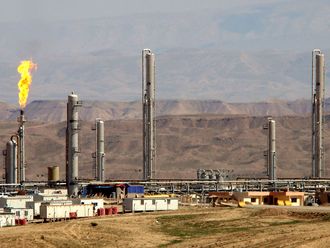Paris : French drugmaker Sanofi-Aventis posted a 9.7 per cent rise in its quarterly business net profit thanks to contributions from swine flu vaccine sales and acquisitions and kept its financial forecast for the year.
The first quarter could turn out to be the most solid of the year as the effect of H1N1 vaccines will fade and the effects of generic competition on key drugs like bloodthinner Plavix and cancer drugs Eloxatin and Taxotere will increasingly weigh. Sanofi still expects 2010 business earnings per share to grow from 2 to 5 per cent at constant exchange rates and excluding the possible launch of a generic to its bloodthinner Lovenox. That compares with double-digit EPS growth in 2009.
Good start
"Our growth platforms delivered double-digit growth enhanced by recent targeted acquisitions and A/H1N1 vaccine sales," chief executive Chris Viehbacher said in a statement, calling the first quarter a "good start to the year".
Business EPS grew a better-than-expected 9.4 per cent to 1.86 euros (Dh9) in the first quarter against Reuters consensus, based on 17 analysts, of 1.77 euros. Business net income rose 9.7 per cent to 2.427 billion euros against consensus for 2.287 billion. Sales rose 3.9 per cent to 7.385 billion, against the poll's 7.427 billion, as diabetes drug Lantus and vaccines helped make up for the detrimental effects of Plavix generics in Europe and a copy of injectable cancer drug Eloxatin in the United States.
Eloxatin sales should recover in early 2011, Sanofi expects, following a settlement it reached with gen-eric drugmakers to temporarily stop selling their copy as of the end of June. Sales fell to 66 million euros in the quarter.
Revenues from pandemic H1N1 or swine flu vaccines reached 413 million euros in the quarter, taking total vaccine sales from the Sanofi Pasteur division to 944 million euros, below forecasts for more than a billion euros.
Sanofi has been steering away from mainly focusing on developing drugs that can sell several billion euros a year but also makes them vulnerable to patent challenges, to expand in areas like consumer health, generics and emerging markets. Cancer drug Taxotere will lose its patent protection in November in Europe and the United States, allowing generic drugmakers to sell cheaper copies.












